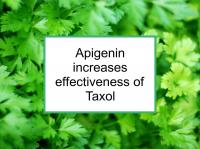Apigenin, a flavone found in a variety of plants, has been found to induce programmed cell death in a variety of breast cancer cells. In addition, population studies have found that consumption of apigenin-rich foods is associated with reduced risk of breast cancer. Apigenin also increases the effectiveness of paclitaxel.
Food sources of apigenin
Parsley, whether fresh or dried, is an excellent dietary source of apigenin. Celery (especially green celery hearts), guava berries, garlic, bell peppers, and bok choy (Chinese cabbage) also are good sources. Apigenin is also found in artichokes, mint, and chamomile, but there less information concerning these foods. Sage is another dietary source of apigenin, but it is on our list of foods to avoid, primarily because sage has been used in traditional medical to influence the reproductive system (including lactation) and it is not clear whether it promotes or inhibits breast cancer growth.
Cell studies show that apigenin inhibits breast cancer cell growth
Apigenin has been shown to inhibit the growth of both regular hormone receptor positive (ER+/PR+) MCF-7 cells and two antiestrogen-resistant sublines (MCF-7 cells with acquired resistance to tamoxifen or fulvestrant (Faslodex)). However, low concentrations of apigenin were found to promote MCF7 cell growth but had no effect on the growth of the antiestrogen-resistant MCF7 sublines. Apigenin has also been shown to inhibit the growth of HER2-positive (HER2+) and triple negative (ER-/PR-/HER2-) breast cancer cells.
Apigenin has been compared to other flavonoids commonly found in plants and found to be among the most effective in inducing breast cancer cell death without harming normal cells. A study that examined the ability of eight flavonoids (apigenin, chrysin, daidzein, genistein, kaempferol, luteolin, naringenin, and quercetin) to induce cell death in a variety of human breast cancer cell lines (triple negative, HER2+, and ER+/PR+) reported that apigenin and luteolin had the strongest effect in all of the cell lines. Kaempferol and chrysin also induced cell death, but only at the highest concentrations used. Daidzein, genistein, naringenin, and quercetin caused cell death very weakly. Another study that investigated the effect of the flavonoids apigenin, naringenin, genistein and kaempferol on invasive growth of triple negative (ER-/PR-/HER2-) MDA-MB-231 human breast cancer cells found that apigenin had the most potent anti-migration and anti-invasion properties.
Diets rich in apigenin are associated with reduced breast cancer risk
Italian and Greek population studies have reported that intake of flavones such as apigenin are associated with reduced risk of breast cancer. An Italian study that included 2,569 breast cancer cases and 2,588 controls reported that the risk of breast cancer was reduced in proportion with increasing intake of flavones (e.g., apigenin, luteolin, tangeretin) and flavonols (e.g., quercetin, kaempferol, myricetin, fisetin).
Apigenin influences chemotherapy and radiotherapy
Several previous studies have reported that apigenin acts synergistically with doxorubicin, cisplatin, 5-FU (5-fluorouracil) and paclitaxel chemotherapy by reducing cancer cell growth, increasing cell death, and reducing proliferation. Apigenin also increases the radiosensitivity of breast cancer cells, thereby enhancing the anti-cancer effects of radiotherapy. However, one study reported that apigenin reduced that effectiveness of both cisplatin and doxorubicin in inducing cancer cell death.
Latest research explains how apigenin acts synergistically with paclitaxel
The new study referenced at the beginning of this news article was designed to investigate the mechanism of action by which apigenin has synergistic treatment effects when combined with paclitaxel in human cancer cells. The authors first demonstrated that a low dose of apigenin had synergistic effects with paclitaxel in HeLa cells. The HeLa cell line is an immortal cancer cell line derived from cervical cancer, which is usually estrogen responsive.
To analyze the underlying mechanism of action, the authors examined reactive oxygen species (ROS; molecules and free radicals derived from molecular oxygen) levels after HeLa cells were treated with (1) apigenin; (2) paclitaxel; or (3) a combination of apigenin and paclitaxel. Apigenin and paclitaxel-induced apoptosis (programmed cell death) was directly related to the level of ROS in the cells. Caspase-2 participated in apigenin and paclitaxel-induced HeLa cell apoptosis. (Caspases are involved in the initiation and execution of apoptosis.) The authors conclude that, taken together, the study results show that apigenin can sensitize cancer cells to paclitaxel-induced apoptosis by increasing accumulation of ROS and cleavage of caspase-2.
Supplementation with apigenin is not advisable
Apigenin is a phytoestrogen whose interactions with breast cancer are still not well understood. There is some evidence that the impact of apigenin on breast cancer cells depends on the dosage, with low doses potentially stimulating breast cancer cell growth. When apigenin is consumed as part of food, it is combined with other micronutrients that have been shown to act synergistically against breast cancer. Consuming apigenin-rich foods is safe and can potentially reduce breast cancer risk, increase the effectiveness of paclitaxel chemotherapy and radiotherapy, and reduce recurrence. On the other hand, safe and effective dosages of apigenin supplements have not been established and apigenin supplementation has the potential to increase breast cancer risk and reduce the effectiveness of treatment.
